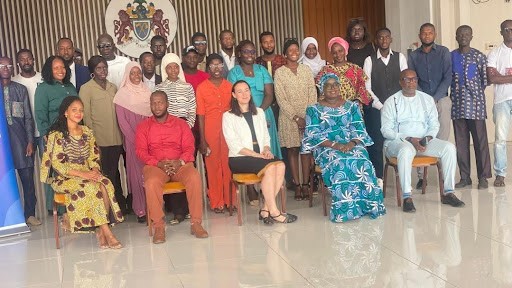By Sariba Manneh
Officials and participants
The International Institute for Democracy and Electoral Assistance (International IDEA), in collaboration with the Gambia Press Union (GPU) and with funding from the European Union, conducted a two-day capacity-building workshop for journalists and editors on December 2-3, 2024. The training, held at the Sir Dawda Kairaba Jawara International Conference Center, aimed to equip media professionals with the skills needed for conflict-sensitive reporting on the implementation of the government’s White Paper on the Truth, Reconciliation, and Reparations Commission (TRRC) recommendations.
In his opening remarks, GPU President Muhammed S. Bah emphasized the importance of ethical journalism in transitional justice. He highlighted the role of journalists in factoring victims and survivors in their stories while avoiding re-traumatization.
“Conflict-sensitive reporting is the cornerstone of ethical journalism, particularly when covering issues such as children’s rights, sexual and gender-based violence, and other sensitive matters arising from the transitional justice process,” Bah stated. He urged journalists to protect the privacy and dignity of survivors while shaping narratives that educate, inform, and inspire change.
Bah further noted the pivotal role of the media in supporting the implementation of the TRRC recommendations. “The TRRC process has laid bare the deep wounds of our nation. As journalists, we have a critical role in promoting healing, accountability, and reconciliation through our reporting,” he added.
Jainaba Faye, Head of the International IDEA Country Office, reflected on the TRRC’s contributions to truth-seeking and accountability. She acknowledged the courage of victims who testified during public hearings, describing these sessions as emotionally charged and vital for uncovering the scale of past atrocities.
Faye commended the government’s commitment to implementing 263 of the TRRC’s 265 recommendations, acknowledging the challenges of achieving full justice and reconciliation. She emphasized the need for victim-sensitive reporting, urging journalists to treat survivors with dignity and compassion.
“This is not just a professional guideline; it is a moral imperative,” Faye stressed. She called for media coverage that respects privacy, avoids stigmatization, and highlights available support systems for victims.
Enya Braun, representing the European Union, reaffirmed the EU’s commitment to The Gambia’s democratic transition, rooted in truth, accountability, and reconciliation. She underscored the media’s role as both a conveyor of information and an agent of change.
“Journalists have the power to shape narratives that promote understanding, hold institutions accountable, and safeguard the rights of victims and communities,” Braon said. She highlighted the importance of professional rigor, empathy, and cultural sensitivity in conflict-sensitive reporting during the post-TRRC period.
The training forms part of the CODE project implemented by International IDEA in partnership with the GPU, demonstrating a shared vision for a peaceful and inclusive Gambia.


















